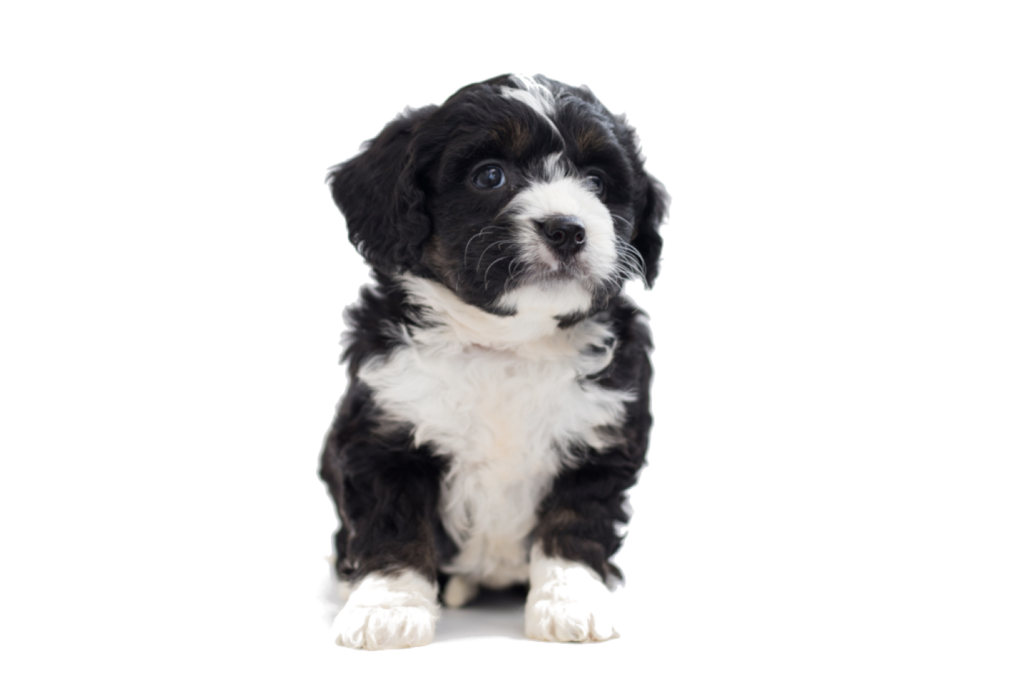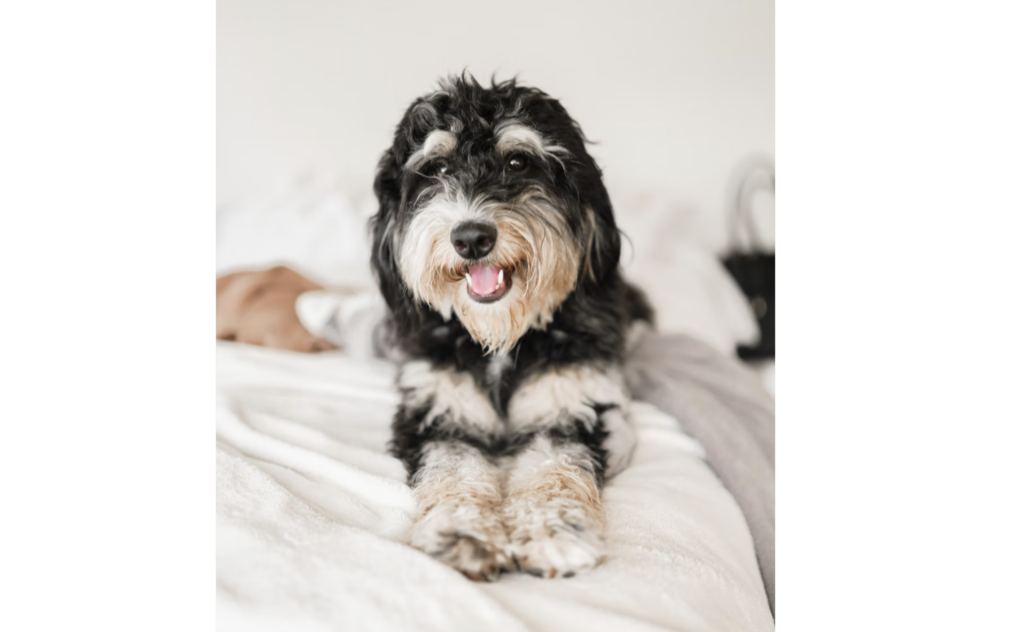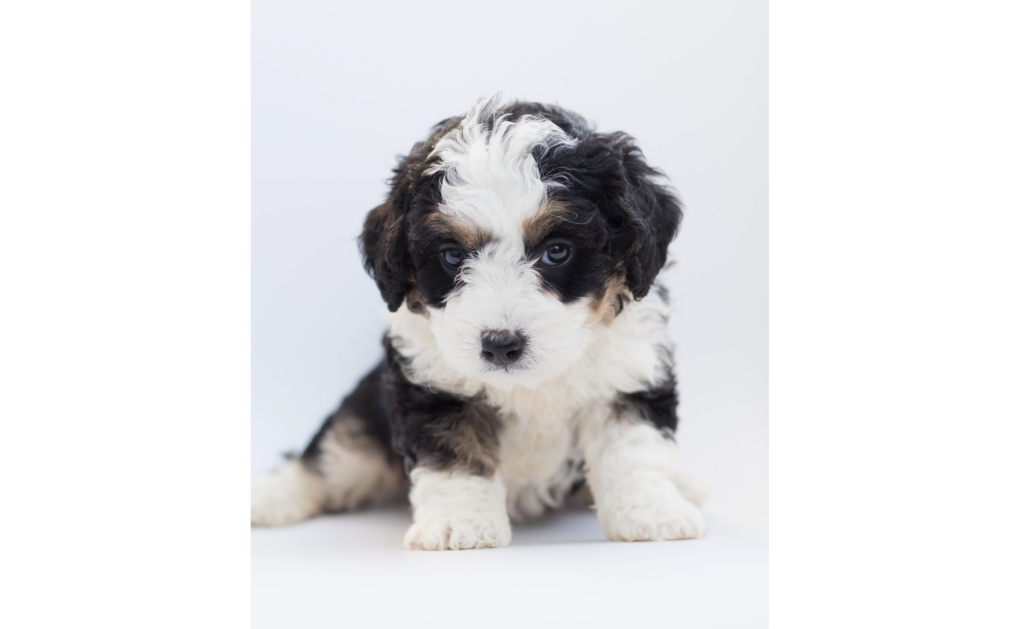
Dog lovers can agree on one thing: if you love big, soft, curly-haired pups, the Bernedoodle is probably right up your alley!
The Bernedoodle is a healthy mixed breed that benefits from “hybrid vigor”, inheriting the best traits of the poodle and the Bernese Mountain Dog. They come in all colors, sizes, and generations, some of which are perfect for pet owners with allergies.
Maybe you plan to adopt a Bernedoodle, or perhaps you’re already a proud owner who is seeking more knowledge about this wonderful crossbreed. Either way, we’re here to help!
Overview
Bernedoodles are created when a Bernese Mountain Dog reproduces with a poodle. The Bernese Mountain Dog is a large breed, so for a safe pregnancy, the poodle is usually selected as the mother.
Bernedoodles are thoroughly European. The Bernese Mountain Dog comes from the Swiss Alps, and its ancestors were brought to Switzerland thousands of years ago by the Romans. The poodle is a refined, elegant breed from Germany and France.
The first Bernedoodles on record were born in the early 2000s, making this one of the newest crossbreeds on the scene. They are one of the most popular designer “doodle” breeds, a category that includes other poodle hybrids such as Labradoodles and Goldendoodles.
Price
As you might suspect, such an amazing dog does not come cheap. Experienced breeders typically charge between $2000 and $5000 for a brand new Bernedoodle puppy.
This is a wide price range, and for good reason. Bernedoodles come in many colors, some of which are in higher demand than others. For example, you can expect to pay top dollar for a merle tri-color puppy due to their popularity and breeding difficulty.
And when it comes to owning a new dog, adoption is just the beginning. You’ll need to invest in high-quality dog food, dishes, treats, grooming and more. You’ll also be responsible for the cost of veterinarian bills, vaccines, and medicine that your pup needs.
And if you ask any Bernedoodle owner whether their dog is worth the price, you’ll get a one-word answer: absolutely!
Interesting Bernedoodle Facts
Generations
A first-generation Bernedoodle, also called “F1”, comes from two purebred parents. This means it is half Bernese Mountain Dog and half poodle.
But what if you LOVE Bernese Mountain Dogs, and you want your Bernedoodle to be larger and have straighter hair? Or maybe you prefer a smaller dog with more curls? You can breed a Bernedoodle with one of its parent breeds. The result is known as an “F1B” generation, which is 75% of one breed and 25% of the other.
Allergies
Bernese Mountain Dogs do plenty of shedding but poodles do not. Due to their poodle genes, Bernedoodles are known to be fairly hypoallergenic. Their hair may need regular trimming, but due to their single coat and lack of shedding, your house will not be covered in sneeze-inducing dander.
If you are worried about your allergies, be sure to ask your Bernedoodle breeder for a generation such as F1B that is mostly poodle. Be prepared for a higher price tag since some generations are in higher demand than others.
Remember, though, that allergies are not just about shedding and dander. Some people are allergic to dog saliva, so a generous lick from your Bernedoodle may be enough to irritate the skin.
Sizes
Bernedoodles are bred in a wide range of sizes. Some can be as small as 10 pounds while others reach up to 90 pounds! Measured at the shoulder, their height can range from 12 to 29 inches. This means you have a lot of flexibility when adopting this type of dog.
The smallest variety, known as the “Mini Bernedoodle”, is bred from a miniature or toy poodle. It is generally more difficult to breed smaller sizes than larger sizes, so expect to pay a bit more for a Mini Bernedoodle.
Behavior and Temperament
As with all hybrid breeds, Bernedoodles are assumed to inherit their personality from their parent breeds. Poodles are highly intelligent and Bernese Mountain Dogs are playful, and you’ll often hear Bernedoodle owners confirming that their dogs possess both of these traits.
However, we have found personality is hard to predict. In fact, your breeder may be the best person to ask. When a litter is born, the breeder should observe the puppies and make notes about their personality as they grow and socialize. They can then select the dog that is best suited for your home.
Do Bernedoodles get along with other dogs?
If they are properly socialized from a young age, Bernedoodles get along well with other dogs. You should feel comfortable letting your well-trained pup off the leash in your local dog park. They are certainly not shy!
Bernedoodle owners also report that their dogs get along well with smaller dogs and other pets. Keep in mind that all dogs have an instinct to hunt and kill prey, but Bernedoodles are much more laid back than other breeds.
Are Bernedoodles good for families?
Like other popular “doodle” crossbreeds, Bernedoodles are perfect for families! They are gentle with babies and young kids. Indoors they are soft and snuggly, while outside they’ll have plenty of energy for playing, running, and fetching.
Some Bernedoodles can be fairly large, so if you’re concerned that your young child may be frightened of a large dog, you can always adopt a smaller variety such as the Mini Bernedoodle.
Are Bernedoodles good for seniors?
Seniors appreciate the comfort and companionship that a dog can offer, and Bernedoodles can be perfect for this job. They are affectionate and playful but less demanding than other breeds.
Generally, they do not need the constant exercise that is required by working breeds such as German Shepherds. This is good news for older dog owners who have limited mobility. Aside from regular haircuts and grooming, the Bernedoodle is a relatively low-maintenance dog.

Things to Consider Before Buying
Once you have decided to adopt a Bernedoodle puppy, you should begin thinking about what is required for keeping your dog happy and healthy. The responsibilities may seem daunting at first, but you’ll quickly find that they are manageable with a few changes to your daily routine.
Food
When you first bring your new Bernedoodle puppy home, be ready with nutritious food for his first meal time. Your new dog will probably consume a cup and a half of food per day, served as 2 or 3 meals.
You can choose kibble, soft food, or a mix of both. After some trial and error, your pup will probably let you know his favorite type!
Just make sure to choose a formula that is appropriate for your dog’s age. The levels of nutrients in Bernedoodle puppy food such as protein and glucosamine are carefully measured to ensure healthy growth of joints and lean muscles.
Exercise
Bernedoodles are happy to rest and snuggle, but they also need plenty of time outside to run and explore. You should plan to give your dog up to one hour of exercise every day.
This mixed breed is not inclined to overheat, but be sure to provide your pup with plenty of cool, clean water, especially when exercising on hot days.
Male vs Female
Some owners believe that male Bernedoodles are goofier and more laid back than females. However, there is not much research to support these anecdotes.
We can make some generalizations about physical characteristics such as height and weight (e.g. males tend to be larger), but for the most part, each dog has a unique personality that does not necessarily correspond to the categories of male and female.
Health
If you acquire your Bernedoodle from an experienced, reputable breeder, you should be given a guarantee that your pup does not show signs of serious health conditions.
One of the most common medical issues found in Bernedoodles is hip and elbow dysplasia. They may also experience skin allergies. Your veterinarian may recommend a special diet for your dog if you notice symptoms of these conditions.
Unless you plan to use your Bernedoodle for breeding, we recommend that you prioritize neutering (for a male dog) or spaying (for a female). In addition to preventing an unwanted litter of puppies, these procedures can reduce aggression and prevent some types of cancer.
Grooming
Similar to its poodle ancestors, the Bernedoodle has a single coat of hair and does not shed. However, you should still brush your dog’s hair regularly to prevent tangles and matting.
And the lack of shedding does have a downside: the Bernedoodle’s hair grows continuously and must be regularly trimmed. Plan to have your pup groomed every 2 to 3 months.
Contrary to popular belief, Bernedoodles do not need daily baths. In fact, you should bathe your Bernedoodle no more than once every few months (unless they become unusually dirty). This will help preserve the natural oils in their hair.
And don’t forget basic hygiene required for all dogs, such as trimming nails, brushing teeth, and cleaning the ears.

Conclusion
As we have explored in this article, Bernedoodles are soft, furry and friendly, perfect for families and individuals alike. They may cost a pretty penny but their intelligence, obedience and loyalty just might be worth it.
If you find a good breeder, you will probably have multiple colors, sizes and generations of Bernedoodles to choose from. And if you plan to adopt, we wish you the best of luck as you begin your journey as a Bernedoodle owner.